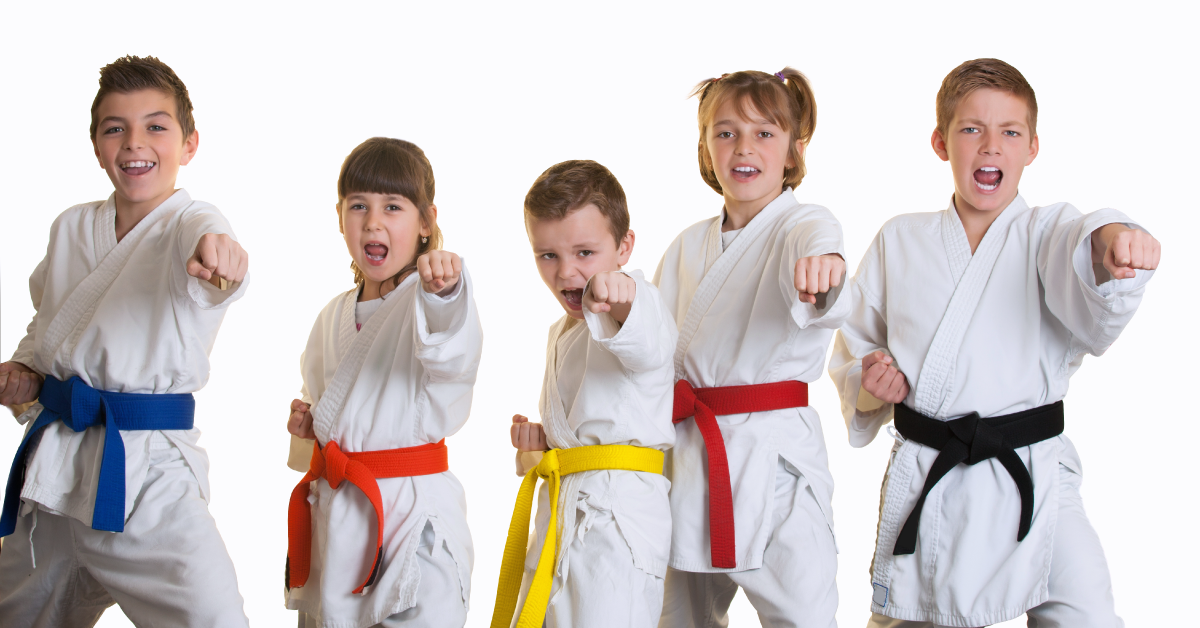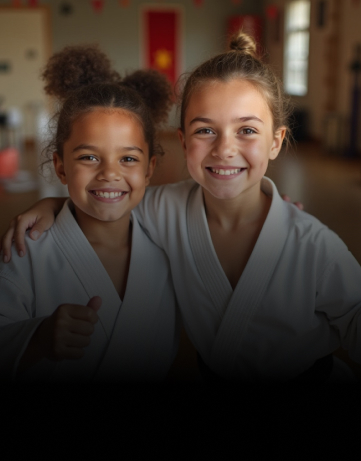Karate for kids – Inspire Your Child Through Respected Martial Arts
Wiki Article
Discover the Advantages of Karate for Kids: a Trip Into Martial Arts for Children
When you consider martial arts for kids, karate usually enters your mind. It's not simply concerning punches and kicks; it's a path to personal growth. Your youngster can acquire physical fitness, discover technique, and develop positive self-image. However there's even more underneath the surface area. As they progress via their training, they'll discover skills that prolong far beyond the dojo. Interested about exactly how martial arts can shape your child's future? Allow's check out the transformative benefits with each other.Physical Fitness and Coordination
Martial arts aids youngsters create physical conditioning and coordination in an enjoyable and engaging means. When your child practices karate, they're not simply learning to kick and punch; they're improving their general toughness, versatility, and endurance. Each class provides a balanced exercise that constructs muscle mass and cardio health and wellness, aiding them remain energetic and energetic.As they find out various stances and motions, kids boost their body recognition and sychronisation. They'll find themselves understanding complicated techniques that test their balance and agility. This playful environment encourages them to push their limits while having a blast with peers.Moreover, the organized regimens in karate classes help in developing motor skills that are necessary for other sporting activities and activities. Your child will certainly leave each session sensation accomplished and extra certain in their physical abilities. By participating in martial arts, they're setting the stage for a life time of healthy and balanced practices.Structure Discipline and Focus
While your youngster discovers martial arts methods, they're also cultivating important skills like discipline and emphasis. Karate courses require your youngster to focus, comply with guidelines, and practice consistently. This organized setting assists them create a sense of duty in the direction of their training. As they find out to set goals, like mastering a new move, they start to recognize the relevance of willpower and tough work.Additionally, the recurring nature of training strengthens concentration. Your kid discovers to shut out interruptions and concentrate on the task at hand. This skill converts to other locations of their life, whether it's homework or sports. By participating in martial arts, they not just hone their martial arts skills but likewise enhance their capability to focus and devote to tasks. Inevitably, this technique and emphasis become useful life skills, encouraging your kid to face obstacles with decision and clarity.Enhancing Self-Confidence
As your youngster advances in karate, they normally build self-confidence via their achievements. Each new ability they understand, from standard stances to advanced strategies, fosters a feeling of accomplishment. When they gain belts or red stripes, it reinforces their idea in their capacities, revealing them that tough work pays off.In class, they encounter challenges that push them out of their comfort area, instructing them to embrace barriers rather than avoid them. This strength translates beyond the dojo, aiding them take on institution projects or social situations with greater assurance.Karate additionally provides a helpful environment where your youngster can celebrate their successes alongside peers, creating a feeling of belonging. As they find out to establish and attain objectives, they develop a solid sense of self-respect. Eventually, martial arts isn't almost kicks and punches; it's a powerful device for building unshakeable positive self-image that will benefit them throughout their lives.
Promoting Respect and Teamwork
In martial arts, you learn the significance of shared respect as you train along with others. Legacy Martial Arts. This martial art motivates teamwork, revealing you just how to work together properly with your peers. Plus, you'll develop essential interaction skills that help you connect with fellow students and trainers alikeBuilding Mutual Respect

Encouraging Group Cooperation
You quickly find that team effort improves your skills and promotes a feeling of belonging when you train in martial arts. Dealing with your peers during drills and competing sessions educates you the significance of cooperation. You find out just how to sustain each other, commemorate successes, and conquer obstacles with each other. This atmosphere urges regard, as you recognize each other's staminas and weaknesses. You'll create a strong bond with your colleagues, which can boost your self-confidence and inspiration. Plus, Home Page understanding methods alongside others assists you expand faster than training alone. By taking part in team events and group courses, you'll understand the value of unity in martial arts. Inevitably, martial arts instructs you that together, everybody accomplishes more, developing a favorable atmosphere for everybody entailed.Developing Interaction Skills

Martial arts isn't nearly physical skills; it's likewise a powerful means to enhance your communication abilities. As you technique, you'll learn to share yourself clearly, whether via spoken commands or non-verbal cues like body language. Taking part in companion drills helps you listen proactively and react to others, cultivating a feeling of regard and teamwork.You'll discover that reliable communication is important in competing, where you require to recognize your companion's actions and intentions. In addition, the dojo environment motivates favorable reinforcement, teaching you to offer and get useful comments. All these components collaborate to build your confidence and social abilities, making you a much better colleague and pal both inside and outside the dojo. Karate really enhances your capacity to get in touch with others.
Developing Problem-Solving Skills
In martial arts, you'll encounter numerous obstacles that require fast reasoning and creativity. As you learn to tackle these obstacles, you'll improve your crucial reasoning and find distinct solutions. This procedure not just hones your mind but also boosts your self-confidence in daily circumstances.Enhancing Vital Believing
As you take part in karate, you'll find that the technique surpasses physical skills; it improves your important thinking and problem-solving capacities. Each lesson challenges you to assess methods, expect moves, and adapt your strategies in real-time. You'll learn to evaluate your challenger's activities, taking into consideration various angles and actions. This consistent assessment sharpens your ability to think on your feet and develop reliable solutions.In competing sessions, you'll deal with unexpected obstacles, calling for fast choices and changes. With this process, you cultivate an attitude that values logic and thinking. Eventually, karate teaches you to approach troubles carefully, enabling you to navigate not only martial arts scenarios but also daily difficulties with self-confidence and quality.Encouraging Creative Solutions
You're not just learning strategies; you're also motivated to assume outside the box and create imaginative remedies when you practice martial arts. Each difficulty in the dojo pushes you to discover innovative methods to overcome barriers. Whether you're competing or breaking boards, you'll commonly face unanticipated circumstances that require fast reasoning and flexibility. This atmosphere nurtures your analytic skills, assisting you find out to evaluate circumstances and devise unique techniques. You'll discover that often, the ideal technique isn't the most obvious one. As you educate, you'll acquire confidence in your capability to tackle problems creatively, both on and off the floor covering. This skill not just improves your fighting styles journey however likewise prepares you for difficulties in everyday life.Encouraging Social Interaction
Martial arts not only shows kids protection but also serves as an amazing platform for social interaction. When your child joins a karate course, they instantaneously become component of a community. They'll satisfy peers who share comparable passions, enabling relationships to bloom through shared experiences. During technique, they'll operate in teams or sets, discovering to communicate efficiently and accept others.This team effort cultivates a feeling of belonging and encourages children to develop links outside their usual circles. As they educate with ohio state football news each other, they'll celebrate each various other's successes and sustain each other during obstacles, enhancing their social skills.Additionally, joining demos or events supplies chances to involve with various other karate fanatics, further improving their social experiences. In this supportive setting, your youngster will not just grow as a martial musician but also create valuable relationships and social abilities that will benefit them throughout life.Cultivating Emotional Resilience
While children learn techniques and forms in karate, they likewise cultivate emotional durability fernandez tennis that can carry them via life's obstacles. In the dojo, they encounter barriers, whether it's mastering a new relocation or competing with a companion. These experiences show them how to manage disappointment and troubles, cultivating a growth mindset.As they progress, they create self-esteem, which assists them deal with psychological hurdles beyond karate. You'll notice your kid comes to be a lot more adaptable, discovering to navigate anxiety and stress and anxiety with better simplicity. They'll recognize that determination is essential; every failure is simply a step towards success.Karate likewise stresses self-control, respect, and discipline, enabling kids to manage their feelings efficiently. This foundation not only improves their martial arts skills yet additionally outfits them with tools to face social pressures and personal obstacles. Eventually, martial arts empowers your child to construct durability that lasts a lifetime.Frequently Asked Inquiries
What Age Is Best for Kid to Beginning Karate?
The best age for children to begin karate is generally around 5 to 7 years of ages. At this stage, they're much more responsive to finding out emphasis, control, and self-control, making it an excellent time for martial arts training.The length of time Does It Require To Make a Belt in Karate?
It usually takes you about 3 to six months to earn a new belt in martial arts, relying on your dedication, ability, and presence development. Normal practice and commitment can aid you advance faster.Exist Any Dangers of Injury in Martial Arts for Children?
Yes, there are some dangers of injury in karate for kids, like any kind of exercise. Nevertheless, proper instruction, security gear, and a focus on method can considerably minimize these threats and assure a risk-free experience.Can Karate Help With Bullying Issues?
Yes, karate can aid with harassing issues. It builds your self-confidence, shows self-defense, and motivates regard for others. You'll learn exactly how to manage fights comfortably, empowering you to stand up versus harasses successfully.What Equipment Do Youngsters Need for Karate Courses?
For karate classes, children generally require a gi, which is the attire, and a belt to indicate their ranking (Legacy Martial Arts). Some institutions might also call for safety equipment like mouthguards and pads for sparring sessions. When your child practices karate, they're not simply finding out to punch and kick; they're enhancing their total strength, versatility, and endurance. In martial arts, you discover the value of mutual regard as you educate together with others. Respect is basic in martial arts, particularly for youngsters learning the art. When you practice martial arts, you're not simply finding out methods; you're additionally motivated to assume outside the box and create innovative remedies. While kids find out methods and types in martial arts, they also cultivate psychological resilience that can lug them through life's challengesReport this wiki page